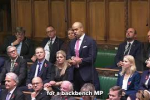
The latest reshuffle is a flexing of political muscle, designed to show Labour’s self-styled leader-in-waiting is theoretically in charge
Angela Rayner was still getting to grips with her myriad titles during the last shadow cabinet reshuffle when she was seemingly deliberately blindsided by the timing of Sir Keir Starmer’s latest attempt to imbue his party with a sense of purpose.
It is only six months since Starmer botched the spring reshuffle that left him with a co-leader rather than a deputy. The latest reshuffle is a clear flexing of political muscle designed to show Labour’s self-styled leader-in-waiting who is theoretically in charge.
Labour’s approach to shadow cabinet roles appears to require that all MPs will serve in it eventually, and thus inevitably there were some eye-catching appointments, none more so than David Lammy. His Lazarus-like resurrection as shadow foreign secretary was somewhat inevitable.
On paper, the appointment of a well-known and experienced Labour MP who is less a seasoned-media-performer than a seasoned-media-presenter (with his own weekly radio show to boot), appears eminently sensible.
But when said appointment comes with a profile that is unlikely to help win back the seats that have been lost — he is an arch-Remainer who has spent much of his time over the past two years fanning the flames of identity politics — one wonders whether the appointment is due to the current dearth of talent among Labour’s experienced MPs, or an unwillingness to appear to be Blair Mark II too quickly.
Lammy is innately a divisive character. Once considered to be a potential future Labour leader his political star has waned in recent years as the hard Left tightened their grip around the party. There was little room for a man who was once a minister under Gordon Brown but has spent the past decade as an opposition backbencher more focused on building his media profile than being an effective politician.
In recent years he has very much found his voice as the vocal champion of whichever cause célèbre would afford him the greatest platform. He continues to campaign tirelessly against Brexit, criticising the then Labour leader Jeremy Corbyn for “vacillating” over calling for a People’s Vote, and doubling-down on his comparison of pro-Brexit Conservative MPs to Nazis and white supremacists as “not strong enough”. Hardly an inspiring choice of personnel to help regain the Red Wall.
A man whose dedication to his own media profile is matched only by his willingness to play the crusader from the backbenches on any number of topics which allow him to play to the gallery.
Impassioned speeches with his trademark admonishing finger-wag that can be clipped for social media, allowing him to expand his burgeoning social media presence.
His querulous speech on the Windrush scandal was merely the opening salvo in an ongoing campaign that has since seen him rail against the deportation of Jamaican foreign national offenders convicted of rape, murder and sexual offences against children. There has been much criticism of activist lawyers, it is incredible that until this week we had one as the shadow justice secretary.
The return of David Lammy to the fold is another indicator that Starmer is set to eschew the promises he made to the Labour left in order to become leader in the first place. It now looks far more clear that Starmer’s initial shadow cabinet was a transitional one.
Intended to assuage the fears of the Left by keeping some representation from the Left of the party, before ousting them completely in favour of the remaining Blairites he could scrape together. It is a gamble that hopes to appeal to the centre whilst alienating the rump of his Party’s base.
Whether the gamble pays off remains to be seen, but Starmer has already shown he has little in the way of new talent to bring off the bench. He will now be hoping that the next person in the shadow cabinet to receive a promotion won’t be the one he blindsided during this one.
Either way, if Labour are to win back the northern seats they lost in 2019, let alone make serious inroads into those seats outside of the major metropolitan areas upon which the bulk of their vote relies, then his task is far bigger than a mere reshuffling.




